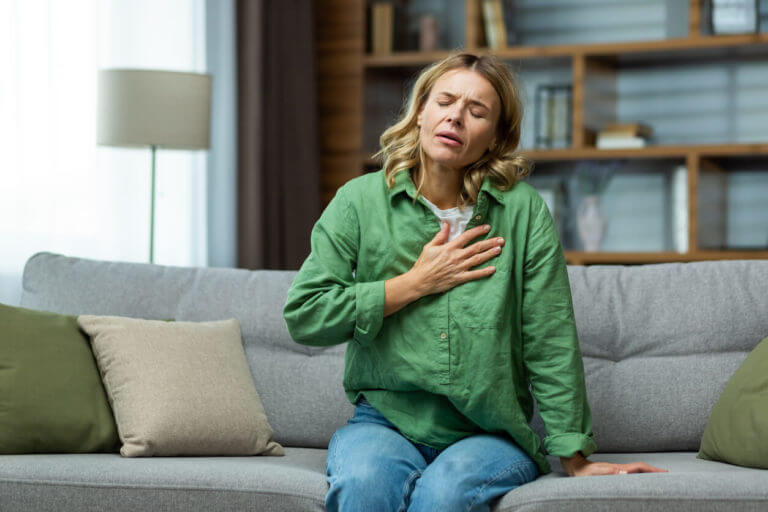
An anxiety flare-up can be distressing, uncomfortable, and persistent for those with anxiety disorders. During a flare-up, you may experience rapid heartbeat and shortness of breath, and you may have racing thoughts and a sense of impending doom. Without proper management, these symptoms can escalate with a negative outcome.
If you suffer from anxiety attacks, it is important to recognize the early signs of increasing anxiety, so that you can respond proactively. In this article, we will give you practical tips to help you recover from an anxiety flare-up and restore a sense of calm.
Symptoms of an Anxiety Flare-Up
Signs that an anxiety attack may be approaching can vary from person to person, but some common indicators include:
- Increased heart rate or palpitations
- Rapid breathing or hyperventilation
- Tightness in the chest or difficulty breathing
- Sweating or feeling hot or cold
- Dizziness or lightheadedness
- Nausea or stomach discomfort
- Tingling sensations or numbness in the extremities
- Muscle tension or trembling
- Racing thoughts or an inability to concentrate
- Heightened awareness of surroundings
- Difficulty thinking logically or clearly
- Intense fear or panic
- Feeling overwhelmed or on edge
- Irritability or agitation
Tips for Managing an Anxiety Flare-up
Here are some practical tips for managing anxiety during an active flare-up:
#1 Practice Deep Breathing
Engage in deep breathing exercises, which are helpful in calming your nervous system. Try inhaling slowly through your nose for a count of four, holding for a count of four, and then exhaling slowly through your mouth for a count of four. Focus on making your exhales longer than your inhales to activate your body’s relaxation response.
#2 Use Grounding Techniques
Grounding techniques can help bring your focus back to the present moment and alleviate feelings of dissociation or panic. List items visible to you, such as objects you can physically touch, sounds audible to you, and two discernible scents.
#3 Progressive Muscle Relaxation
Progressive muscle relaxation (PMR) is a technique that involves tensing and then relaxing specific muscle groups in a systematic way to promote relaxation and reduce muscle tension. Gradually tighten and then release individual muscle groups in your body, starting at your toes and moving up toward your head. This method can assist in relieving physical tension and encouraging relaxation.
#4 Practice Mantra Meditation
Choose a word or phrase that has a personal meaning. Begin repeating your chosen mantra silently or softly aloud with each exhale, focusing your attention on the sound and rhythm of the mantra. Continue this practice for 10-20 minutes, allowing the mantra to guide your thoughts and promote a sense of inner calm and peace.
#5 Challenge Negative Thoughts
To overcome negative thoughts or feelings, challenging them can be a very effective approach. Challenge irrational or catastrophic thoughts by asking yourself questions like, “Is this thought based on facts or assumptions?” “What evidence supports or contradicts this thought?” and “What would I tell a friend who had this thought?”
#6 Reach Out for Support
One way to alleviate feelings of anxiety is to reach out to a loved one or a mental health professional for support. Talking about your feelings can also provide perspective. Oftentimes, it helps to get your feelings out because when you put your feelings into words, you regain self-control.
#7 Create a Safe Space
Create a safe and calming environment for yourself, whether it’s a cozy corner with pillows and blankets or a quiet room with soothing music or sounds. Make some chamomile tea to help relax your nerves and achieve a sense of calm.
#8 Limit Stimulants
Avoid caffeine, nicotine, and other stimulants that can exacerbate anxiety symptoms. A lot of people pick up bad habits as a means to relax, however, this is counterintuitive and can lead to other problems.
#9 Practice Self-Compassion
Be kind to yourself during an anxiety flare-up. Remember that sometimes, anxiety is a normal response to something, and you’re doing the best you can to manage your symptoms. Be kind and compassionate to yourself.
If you are struggling with anxiety, seek anxiety counseling from a mental health therapist or psychiatrist. Anxiety counseling offers a safe space to explore and understand your feelings, thoughts, and behaviors, helping you gain insight into the root causes of your anxiety. Through counseling, you can learn coping skills and strategies to manage your anxiety more effectively.
Anxiety Counseling in Virginia
The team of mental health therapists at Apex Psychiatry VA offers comprehensive support for the management of anxiety disorders. Our team treats patients of all ages, from children and adolescents to adults. We are deeply committed to helping alleviate your symptoms and empowering you to take back control of your life.
To schedule an appointment for anxiety counseling, call our office today at (540) 906-2739 or use our convenient online form. We look forward to providing you with comprehensive mental health services in Virginia.

